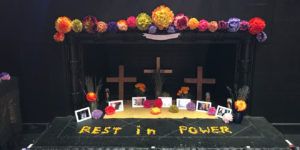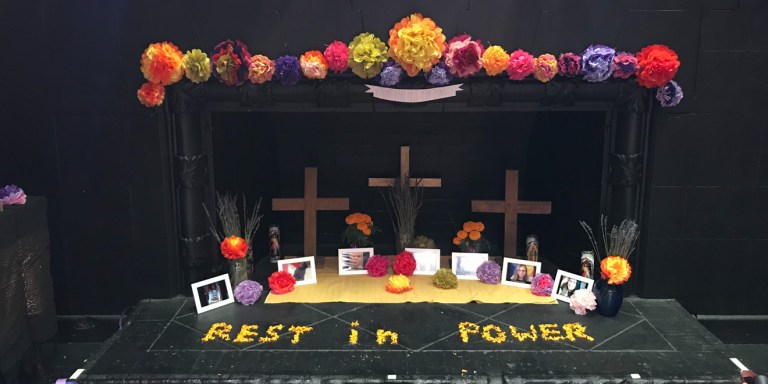To honor both Día de los Muertos and Transgender Day of Remembrance, Stanford’s Nitery Experimental Theater (NExT) and JUST ART: Stanford Artist/Art Collective initiated the Marigold & Lavender Project, a week-long event that focuses on the intersection between the oppression of the Latinx and transgender communities.

Marigold & Lavender is named for the Latino tradition of sprinkling marigolds on the floor to usher loved ones into one’s home and for the lavender colors of the transgender flag. The event is a series of visual art performances, altar exhibitions and project performances including spoken word, acting, music and storytelling.
“One of the things we noticed when we looked at the number of people killed each year is that more often than not, they are trans people and trans women of color,” said Thao Nguyen, a fourth-year Ph.D. student in theater and performance studies as well as co-producer of Marigold & Lavender and co-founder of JUST ART. “There has been an ongoing queer and trans-feminist tradition in which Día de Los Muertos is not only a cultural observance, but also a moment for political action in which we can contend with our history of colonial violence, hate violence and anti-trans violence.”
Karina Gutierrez, co-producer of the event as well as a fourth-year Ph.D. student in theater and performance studies, added that she hoped to honor performances and traditions in the Latinx community, which she feels do not necessarily get a platform on campus.
“It’s a really great event to put both practices in conversation with each other by acknowledging the deaths of many trans women and men of color,” she said.
Marigold & Lavender is one of both NExT and JUST ART’s first campus events.The Nitery Experimental Theater began last year as a student curatorial board funded by the Theater and Performance Studies (TAPS) department, with one theme for each design season This year’s theme is displacement, and co-artistic directors Gutierrez and Áine Tyrell are interested in exploring the theme through a nontraditional, non-Western form of performance.
“NExT, as a board, is determined to create a space for political theater and activist theater,” Tyrell said. “It doesn’t even need to have a particular agenda – oftentimes it can just be theater that doesn’t ordinarily get produced on campus.”
Marigold & Lavender is the second production that JUST ART: Stanford Artist/Activist Collective has put on, the first being a performance response last April to the Brock Turner case and its media representation. According to Nguyen, both the collective and NExT aim to uplift the voices of minority individuals in the community.
“We’re trying to look at some of the most overlooked and marginalized communities and issues – that’s the perspective that we’re interested in,” said Nguyen.
The groups’ similar objectives made their collaboration on the Marigold & Lavender Project natural. For the event, the directors thought about how they could unite both of these communities to build solidarity and understand how racism, transphobia and queerphobia all may be part of a larger system of oppression.
“We hope to build a site of remembrance,” Gutierrez said. “In times like these, we need to continue to fight like hell for the living, as well as remember those who have made the ultimate sacrifices. In moments where we feel weak, we need to remind ourselves that we stand on the shoulders of giants, and that as artists, scholars and students, we have a responsibility to do what’s right.”
“It’s a small drop in a large bucket of water,” Tyrell added. “We hope that people will walk in and walk out knowing there are people who they can talk to.”
Monday’s Visual Art and Altar Exhibition included an Artists’ Talk where visual artists and altar-makers shared the development of their pieces and the inspirations behind their works. It also featured a gallery showcasing the artists’ pieces, including a community altar open to the public where individuals could write notes and letters to their loved ones.
Writer David Albán Hidalgo ’17 M.A. ’18, who contributed a collaborative piece together with artist Eda Benites ’18, said that the gallery humanized the victims that it honored.
“Certain people are so marginalized they aren’t even seen as human. I think it’s really powerful to see the humanity of each person through each photograph here [in the community altar],” said Albán Hidalgo.
Visual artist Sophia Xiao agreed that artists and activists must stay deeply engaged in issues of oppression and discrimination.
“It’s really important to remember that the only way we can move forward is if we keep these topics very close to us,” said Xiao.
The members of Nitery Experimental Theater and JUST ART hope to use their art to inspire the Stanford community and encourage all students – from undergraduates to non-art/performance majors – to participate in their future events.
“I believe a part of art is imagining a different world, and I do not believe we can move forward to create a different world if we don’t spend some time imagining it,” said Nguyen. “I genuinely believe that communities are going to come together in solidarity to support each other’s struggles.”
Contact Felicia Hou at fhou ‘at’ stanford.edu.
